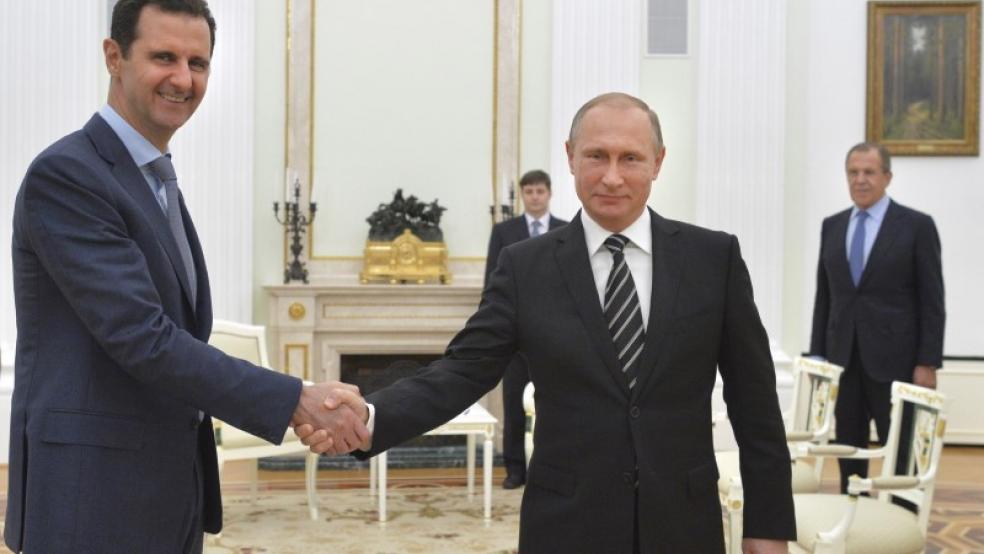Regular consumers of Russia’s state-run media are used to seeing Russian President Vladimir Putin portrayed as a man’s man. He is frequently photographed shirtless, on horseback, clutching firearms of one sort or another, and in other poses that reinforce the alpha male persona he has assiduously crafted over the years.
On Wednesday, however, the Kremlin-controlled media outlets were pushing a different version of the president: Vladimir Putin the international diplomat.
Related: Putin’s Aggression Leaves NATO Searching for a Response
The day before, unbeknownst to almost everyone in the world, Syrian President Bashar al-Assad made his first international trip since civil war broke out in his country in 2011, flying to Moscow to meet with Putin.
Since last month, Putin’s military has been assisting Assad’s beleaguered forces with air strikes aimed mainly against rebels who are resisting Assad’s rule. The conflict in Syria has three primary participants. In addition to Assad’s forces and the various rebel groups opposing him, the terror group ISIS has taken over large parts of the country and is fighting both Assad and the rebels.
Putin’s original justification for Russian involvement in Syria was to fight ISIS, which he described as a threat not just to Syria but to Russia itself. However, both the U.S. and international monitors have said that the vast majority of Russian strikes have been against the rebel groups challenging Assad’s hold on key parts of the country and not against ISIS, which holds territory farther away.
The meeting in Moscow, which Kremlin officials said lasted for three hours, was followed by a blitz of stories in the Russian media describing a Putin who has taken charge of the effort to bring stability back to the Middle East.
Related: As Russia Agrees to Flight Rules, Will U.S. Use A-10 Tank Killers in Syria?
Leonid Kalashnikov, the deputy chairman of the Russian Duma’s International Affairs Committee, said, "Assad’s visit indicates that he is ready to discuss not only military issues, but also political aspects precisely with Russia. This strengthens Moscow’s position in the international format on talks on the Syrian settlement.”
Another report, in Lithuania’s ELTA news agency, quoted Giedrius Cesnakas, the deputy dean of political science and diplomacy at the Vytautas Magnus University, saying, “By inviting Assad to Moscow, Russia sends the West a signal: Moscow is the actor that should be present at the negotiating table on Syria’s future."
According to the Kremlin-run TASS news agency, Cesnakas said the visit signals to the West, and to the U.S. in particular, "that it is necessary to keep up the dialogue [with Moscow], since it continues to be an important player in the region.”
Other stories noted that Putin had personally spoken to the leaders of Turkey, Saudi Arabia, Egypt and Jordan after the meeting with Assad, reinforcing the impression that it is the Russian leader who is in charge of the process of finding a solution to the conflict in Syria, which has cost hundreds of thousands of lives and displaced millions.
Related: Brookings Scholar to Vladimir Putin: Fight Me!
The war has made Assad a pariah in most of the world because of the brutal tactics he has used to suppress the revolt, including the indiscriminate bombing of civilian populations and the use of chemical weapons. Western governments, including the U.S., have called for his ouster.
Despite the many words spent describing the Assad visit and its aftermath, there was little information available about what actually transpired between the two leaders.
Kremlin spokesman Dmitry Peskov offered little, even to the state media.
Asked if the leaders had discussed a political settlement to the conflict or the possibility that Assad might step down, he said, “Such details are certainly unavailable.”
Related: Putin Flexes His Muscles in the Pacific with the New Su-35 Fighter
He added, “Naturally, it would be inappropriate to talk about a political settlement in conditions when a terrorist threat fraught with Syria’s disintegration and the loss of its territorial and political integrity is still dominating in the country.”
He also declined to comment on whether or not it would be possible, in the near term, to hold elections to install a new government at any point in the near future. “I have nothing to add on this point," he said.
Policy + Politics
Putin Rolls Out a New Persona for Assad: International Diplomat

© RIA Novosti / Reuters




